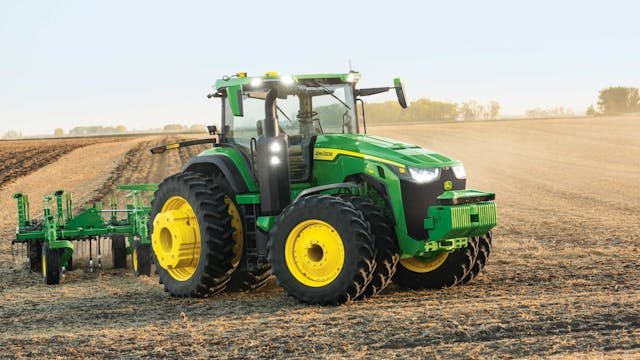John Deere loses battle in “Right to Repair” war
The saga of consumers’ “right to repair” their vehicles has waged in the courts for years, but a shift came yesterday as American Farm Bureau Federation (AFBF) and John Deere signed a memorandum of understanding (MOU). The six-page document, which you can read here, places farmers and independent repair shops in the driver’s seat when it comes to maintaining tractors. However, the agreement is not as final—or as binding—as Right to Repair advocates would hope.
Unfamiliar with the debate? Hagerty’s Rob Siegel lays it out in this article from 2020:
The term “Right to Repair” (sometimes abbreviated as “R2R”) is both general and specific. In a broad sense, it refers to a number of consumer rights initiatives where owners of goods—from automobiles to farm machinery to electronics—push for the right to take these products somewhere other than the dealer to be fixed at a reasonable cost, and that’s where vehicle manufacturers (VMs) push back, touting trademark issues and trade secret concerns. As cars have gotten more and more complex, these battles generally aren’t over nuts and bolts—they’re over hardware, software, access to data, and the money that that brings. No VM is asserting you don’t have the right to change a flat tire or replace a wiper blade yourself.
The MOU is signed by a lobbyist for the American Farm Bureau Federation, which represents consumers, and by Deere and Company. It outlines how the manufacturer will allow both private individuals and independent repair facilities to access and repair anything on a piece of Deere equipment. Resources are now available to farms and to shops that John Deere had refused to share: everything from software required to read the data from the onboard diagnostic systems to specialty tools needed to perform physical maintenance.
Of course, the manufacturer support won’t be free, as the wording of the memorandum does make frequent use of “Fair and Reasonable terms.”
The memorandum represents a big win for consumers, but because the document represents an agreement reached outside a court of law, it cannot serve as legal precedent in future lawsuits. The Right to Repair war is far from over.
One of the interesting bits of legalese in the brief document lies in the definition of the MOU’s purpose, which is to “assure that the intellectual property of Manufacturer, including copyrighted software, is fully protected from illegal infringement through the modification of Embedded Software.”
That copyrighted software—used to diagnose tractors and equipment on-site—is what started this legal battle. Since farmers and shops did not have access to the software, they had to schedule a visit from a dealer authorized to use the software, or take their broken-down tractor into an authorized dealer themselves.
If that lack of manufacturer support surprises you, remember that John Deere just announced a fully autonomous tractor at 2023’s Consumer Electronics Show.

Buried deeper in the memorandum is a single sentence that carries a lot of weight given the history of litigation regarding the topic of Right to Repair. The phrasing indicates that this MOU is essentially a dodge to keep regulators from stepping into the fray: “In the event that Manufacturer or AFBF concludes that, due to changed circumstances, the MOU may no longer be viable, that party shall provide written notice to the other party of its intent to withdraw from the MOU due to the change in circumstances.”
That sentence provides an out, and would likely reopen lawsuits should it be used by either party. John Deere seems dedicated to avoiding a revived case, as it mentions plans to meet with AFBF at least twice a year to evaluate progress.
The memorandum follows an executive order given in July of 2021 by the Biden administration to the Federal Trade Commission, asking the FTC to draft policy that fights “unfair anticompetitive restrictions.” Included in that category would be John Deere’s (previous) refusal to share this diagnostic software, since such a stance makes it difficult for buyers to repair their products or hire the shop of their choice to do the repair for them. The FTC quickly and unanimously voted to ramp-up enforcement of Right to Repair laws following that executive order, though all’s been quiet since.
Could this memorandum of understanding be an attempt by Deere to get minimal or lighter treatment as the FTC drafts the legislation demanded in July? We can’t say, but there is a lot of potential for this agreement and process to become a template for other brands and manufacturers in the future.
Check out the Hagerty Media homepage so you don’t miss a single story, or better yet, bookmark it.



john deere and every other company trying to fleece poeple for more money is criminal.we buy your product isnt that good enough for you.most cost an arm and and both legs to afford.if it was me,i would buy from a place with no hidden agenda.just plain rediculous
There was a time when our local JD dealer would toss in a new garden tractor, snowmobile or similar priced item when we bought a new combine or tractor. That was back when they were $70K and $50K respectively. Today that tractor runs around $650K, there are no incentives and I can barely change the oil without a blessing from above. Not complaining about the prices, most everything is at least 10 times what it was in the early 70’s. Granted the equipment is more efficient, more comfortable and more reliable; but damn, give me access to the tools I need to make repairs on my schedule.